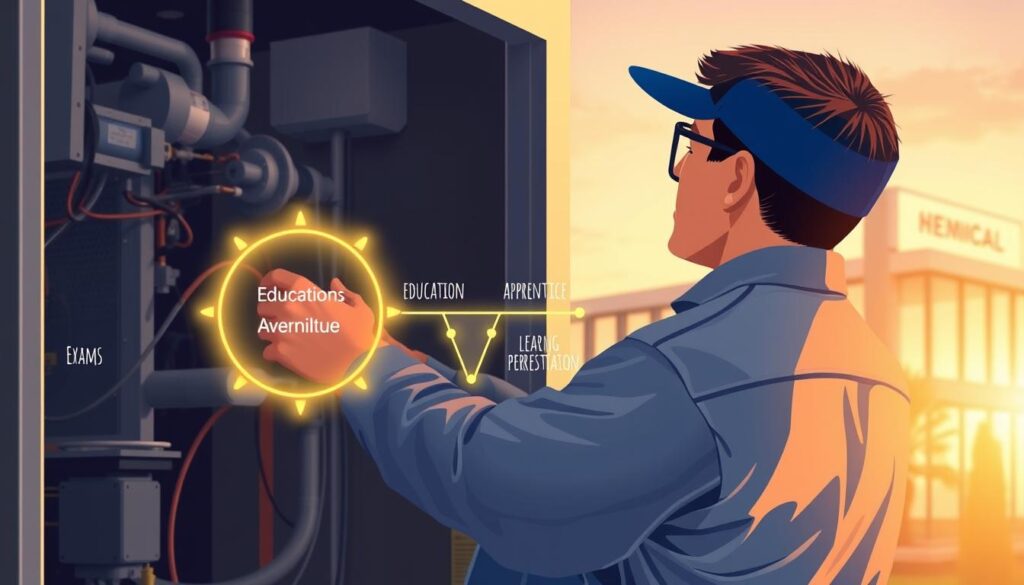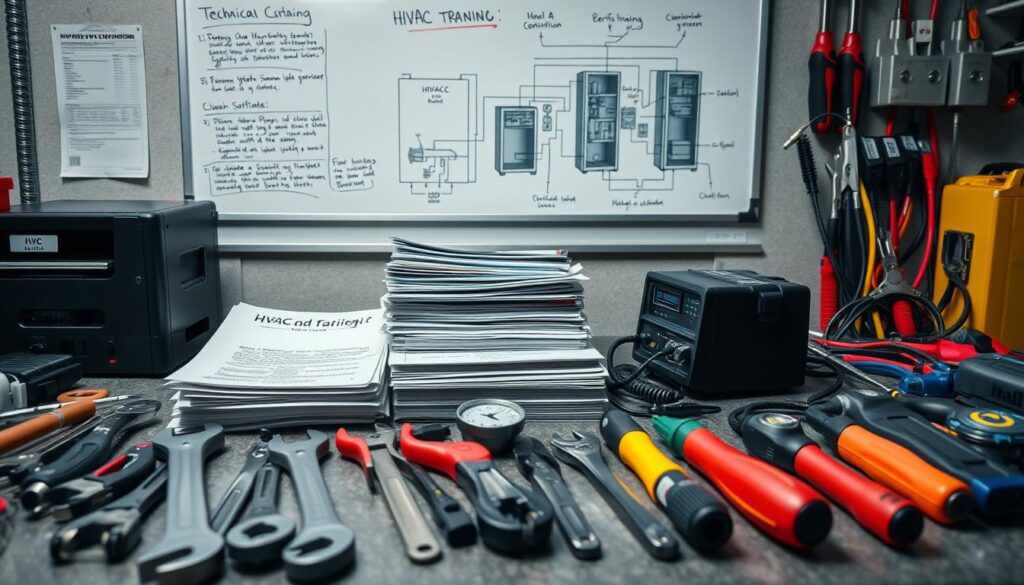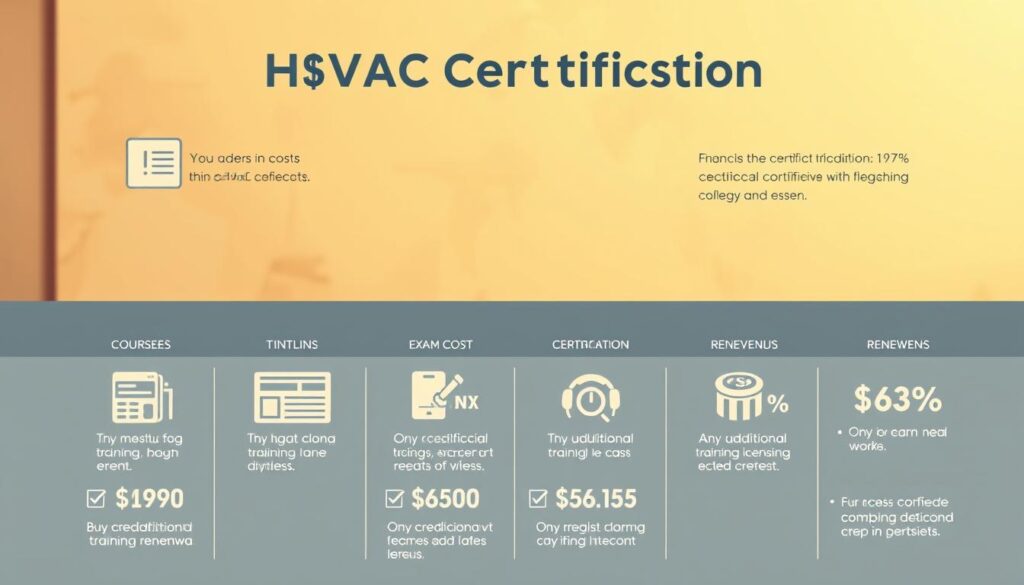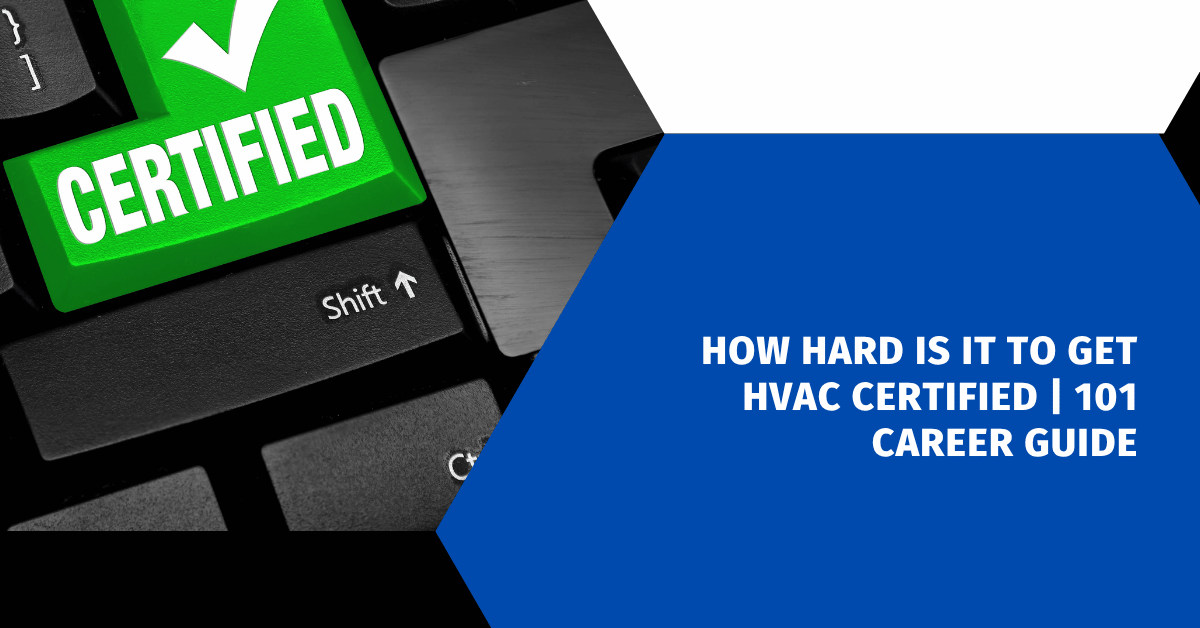Affiliate Disclosure
HVAC Guide Guys is a participant in the Amazon Services LLC Associates Program, an affiliate advertising program designed to provide a means for sites to earn advertising fees by advertising and linking to Amazon.
How Hard Is It to Get HVAC Certified? Are you curious about the effort needed to get HVAC certified? Becoming an HVAC pro might seem tough, but it’s doable.

The HVAC field is booming in 2024. There’s a big need for skilled workers in homes, businesses, and factories. Knowing how hard it is to get certified can guide you well in this career.
Certification proves you’re skilled and knowledgeable. It’s more than a piece of paper. It opens doors to better jobs and higher pay in HVAC.
Key Takeaways
- HVAC certification shows you’re a pro
- Training lasts from 6 months to 2 years
- There are many paths to certification
- Practical experience is key to success
- Certification can really help your career
Table of Contents
Understanding HVAC Certification Basics
HVAC certification is key for technicians starting a career in heating, ventilation, and air conditioning. It shows you know how to handle complex HVAC systems. This is a big step in your career.
Looking into HVAC technician certification, you’ll find many paths to success. There are many ways to show you’re good at what you do.
Types of HVAC Certifications
The HVAC certification exam covers different areas, like:
- EPA Section 608 Certification
- North American Technician Excellence (NATE) Certification
- HVAC Excellence Certification
- Refrigeration Service Engineers Society (RSES) Certification
Industry Recognition and Standards
“Certification is not just a piece of paper – it’s proof of your commitment to professional excellence.”
Industry standards are important for HVAC technician certification. They show you meet high professional standards and offer quality service.
Benefits of Getting Certified
Getting certified in HVAC has many benefits:
- Enhanced Job Opportunities: Employers want certified technicians
- Higher Earning
- Professional Credibility
- Expanded Skill Set
The HVAC industry is growing, with a 4% increase expected by 2026. Getting certified is a smart move. Most certifications need at least 12 months of experience. This ensures you learn both theory and practical skills.
Educational Requirements for HVAC Certification
Starting your HVAC journey means knowing the key educational steps. Most HVAC courses need a strong educational base. This prepares you for technical training and success in your career.
- High school diploma or GED certificate
- Minimum age of 18 years
- Passing basic math and reading comprehension assessments
There are several ways to start your HVAC education:
- Vocational School Programs: Short-term training lasting 6-12 months
- Community College Technical Programs: Associate degree options spanning 2 years
- Apprenticeship Training: 2-5 year programs combining classroom and practical experience
“Investing in your HVAC education is the first step toward a rewarding technical career.” – Industry Expert
The Bureau of Labor Statistics says HVAC training is key. Most programs need 30-60 credits. This ensures you learn a lot about system design, installation, and maintenance.
Pro tip: Pick accredited programs. Look for ones recognized by HVAC Excellence and the National Center for Construction Education & Research (NCCER). This boosts your career chances.
Explore Our HVAC Shop
Looking for top-rated HVAC tools, parts, and accessories? Visit our shop and find the perfect solution for your needs.
Visit the ShopHVAC Training Program Options
Choosing the right HVAC training program is key to starting a successful HVAC career. You have several paths to become an HVAC technician. Each path has its own benefits for your professional growth.
Understanding your educational options is important when looking at hvac training programs. Let’s dive into the most popular ways to get the skills and certification you need.
Vocational Schools and Technical Colleges
Vocational schools offer focused hvac certification online programs. These programs last from 6 months to 1 year. They provide:
- Comprehensive technical training
- Hands-on laboratory experience
- Industry-standard curriculum
- Preparation for certification exams
Apprenticeship Programs
Apprenticeships are a great way to learn HVAC skills. These programs last 3 to 5 years. They mix:
- Classroom instruction
- Paid on-the-job training
- Mentorship from experienced professionals
- Gradual skill progression
“An apprenticeship provides real-world experience that classroom learning alone cannot deliver.” – HVAC Industry Expert
Online Training Opportunities
Online hvac certification programs offer flexibility. They are perfect for those balancing work and school. These programs include:
- Self-paced learning modules
- Virtual simulation labs
- Professional certification preparation
- Accessible from anywhere with internet connection
Choosing the right training path depends on your goals, schedule, and learning style. Each option has its own benefits to help you succeed in HVAC.
Explore Our HVAC Shop
Looking for top-rated HVAC tools, parts, and accessories? Visit our shop and find the perfect solution for your needs.
Visit the ShopHow Hard Is It to Get HVAC Certified: A Detailed Analysis
Getting an HVAC certification is tough but doable. It needs hard work, technical skills, and smart planning. To become an HVAC certified pro, you must go through several steps. These steps test your knowledge, skills, and dedication to the field.
The challenge of getting HVAC certified varies based on several factors:
- Technical complexity of HVAC systems
- Comprehensive educational requirements
- Rigorous certification exam standards
- Continuous learning and skill development
Knowing what the HVAC certification exam covers is key to good preparation. The exam tests your knowledge in areas like:
- Electrical systems and components
- Refrigeration principles
- System installation techniques
- Safety protocols and environmental regulations
“Success in the HVAC certification exam requires thorough preparation and a deep understanding of technical systems.” – HVAC Industry Expert
The North American Technician Excellence (NATE) certification is highly respected. To tackle the challenge of getting HVAC certified, you must commit to detailed training. These programs should mix theory with hands-on skills.
| Certification Level | Average Preparation Time | Exam Difficulty |
|---|---|---|
| Entry-Level Certificate | 6-12 months | Moderate |
| Advanced Certification | 2-4 years | High |
| Specialized Credentials | 1-2 years | Very High |
Pro tip: Keep up with industry trends, like smart home tech and IoT, to boost your certification chances.
Time Investment and Program Duration
Starting your journey to become an HVAC professional needs careful planning. You must understand the time needed for different hvac training programs. The path to certification changes based on the program you pick.
Certificate Programs Timeline
Certificate programs are the fastest way to start your HVAC career. They last from 6 to 12 months. These programs give you intense technical training for entry-level jobs.
- Condensed curriculum focusing on core HVAC skills
- Can be completed in as little as 6 months
- Ideal for those seeking rapid career entry
Associate Degree Requirements
An associate degree offers a deeper HVAC education. These programs take two years. They cover both technical knowledge and general education.
| Program Type | Duration | Key Features |
|---|---|---|
| Certificate Program | 6-12 months | Quick technical training |
| Associate Degree | 18-24 months | Comprehensive technical and general education |
Apprenticeship Length
Apprenticeships are great for those who want real-world experience. They last 3 to 5 years. You get classroom learning and on-the-job training.
“An apprenticeship is not just about time, but about mastering the craft of HVAC technology.” – Industry Expert
When choosing your HVAC certification path, think about your career goals, available time, and money. Each option has its benefits for a successful HVAC career.
Explore Our HVAC Shop
Looking for top-rated HVAC tools, parts, and accessories? Visit our shop and find the perfect solution for your needs.
Visit the ShopEssential Skills and Technical Knowledge

To be a top HVAC technician, you need more than basic skills. Your journey to get certified will teach you about complex systems and technologies. These are key to keeping indoor climates just right.
Important technical skills for HVAC certification include:
- Advanced understanding of refrigeration cycles
- Electrical systems and wiring diagnostics
- Thermodynamic principles
- Mechanical system troubleshooting
- Modern technological tool proficiency
“Success in HVAC is not just about technical skills, but adaptability and continuous learning.” – Industry Expert
It’s not just about knowing how things work. You also need to think critically, solve problems, and serve customers well. Being able to fix complex issues fast and talk to clients clearly is what makes you stand out.
| Skill Category | Required Competencies |
|---|---|
| Technical Skills | Refrigerant handling, electrical diagnostics, system installation |
| Soft Skills | Communication, time management, customer service |
| Technological Proficiency | ServiceTitan software, digital scheduling tools |
Continuous learning is the cornerstone of success in HVAC certification. With technology changing fast, keeping up with new tools and methods is essential. Your dedication to learning will shape your future in this fast-paced field.
EPA Certification Requirements and Process
If you’re looking into an HVAC career, knowing about EPA certification is key. The Environmental Protection Agency requires specific certifications for those working with refrigerants. This ensures both environmental safety and professional skill.
Section 608 Certification Levels
The EPA Section 608 Certification has four levels. Each level is for different refrigerant handling needs:
- Type I: Small Appliance Servicing
- Type II: High-Pressure Appliances
- Type III: Low-Pressure Appliances
- Type IV (Universal): Servicing All Appliance Types
Study Materials and Preparation
To get ready for your hvac certification exam, you need to study hard. Here are some tips:
- Get official EPA study guides.
- Do online practice exams.
- Go to professional training workshops.
- Review technical refrigerant handling manuals.
Exam Structure and Content
The EPA certification exam tests your knowledge of refrigerant management. It has 80 multiple-choice questions to be done in three hours. You need a 70% score to pass the hvac certification exam.
“Proper preparation is the key to successfully navigating the EPA certification process.” – HVAC Professional Insight
The cost for the EPA Section 608 Certification is about $120. It’s a must for legally handling refrigerants in your HVAC career.
Explore Our HVAC Shop
Looking for top-rated HVAC tools, parts, and accessories? Visit our shop and find the perfect solution for your needs.
Visit the ShopState-Specific Licensing Requirements
Getting an HVAC license can be tricky because each state has its own rules. It’s important for those wanting to work in HVAC to know these rules well.
State licensing rules change a lot across the U.S. Here are some things to think about when getting your HVAC certification:
- Minimum work experience requirements
- Educational background qualifications
- Mandatory examination processes
- Specific state-level credentials
Now, let’s look at some examples:
- Nevada requires 4 years of minimum experience for a contractor’s license
- Alabama mandates 3,000 hours (18 months) of work experience under a licensed contractor
- California requires four years of experience in the previous decade for licensing
“Know your state’s specific requirements before beginning your HVAC certification journey.”
Important things to remember for HVAC certification include:
- Passing state-specific licensing exams
- Providing proof of work experience
- Meeting insurance and bonding requirements
- Completing continuing education
Some states, like Colorado, don’t have statewide licensing. Others, like Connecticut, have many different HVAC licenses. Where you live will affect your certification path.
Cost Analysis of HVAC Certification
Understanding the cost of HVAC certification is key for those starting out. The cost to become an HVAC pro varies a lot. It depends on your education path and the certifications you need.

Training Program Expenses
HVAC certification courses have different prices in each state:
- California: $7,500 average in-state tuition
- New York: $10,500 training program cost
- Texas: $11,000 for complete training
- Michigan: $5,600 for post-secondary education
- Louisiana: $12,000 for full training
Certification Exam Fees
Certification exams are a big part of your HVAC career costs. The costs for exams include:
- State licensing exam fees: $50 to $150
- EPA 608 certification: $40 to $240 per type
- Administrative fees: About $135
Continuing Education Costs
Keeping your HVAC certification up to date has ongoing costs:
- First-year annual fee: $100 to $300
- Subsequent annual renewal: $50 to $150
- Continuing education courses: Prices vary by state
“Investing in your HVAC certification is an investment in your future career.”
The initial cost of HVAC certification might seem high. But, the long-term benefits are worth it. HVAC technicians can earn good salaries and see strong job growth. Some states expect a 27% increase in HVAC jobs.
Career Opportunities After Certification
Your hvac technician certification opens doors to exciting career paths in the rapidly growing HVAC industry. The job market for certified professionals continues to expand, with employment projected to grow by 15% over the next decade.
Graduates with hvac certification requirements can explore diverse career options, including:
- Residential HVAC Technician
- Commercial HVAC Installer
- Refrigeration Service Technician
- Solar HVAC Specialist
- Energy Efficiency Auditor
Salary ranges vary, showing the specialized skills you’ll develop. Entry-level positions usually earn $30,000 to $69,000 a year. With experience, you can see significant salary growth.
“Your certification is your passport to a dynamic and rewarding career in the HVAC industry.” – Industry Expert
| Career Path | Salary Range | Growth Potencial |
|---|---|---|
| HVAC Technician | $30,000 – $69,000 | High |
| Solar Energy Technician | $29,000 – $56,000 | Medium |
| HVAC Instructor | $33,000 – $94,000 | Very High |
To make the most of your career, keep learning, network, and stay up-to-date with new tech. Your hvac technician certification is just the start of a thrilling career journey.
Explore Our HVAC Shop
Looking for top-rated HVAC tools, parts, and accessories? Visit our shop and find the perfect solution for your needs.
Visit the ShopTop HVAC Schools and Training Centers
Across the United States, several top institutions offer exceptional hvac training programs. These schools provide detailed hvac certification courses. They aim to prepare students for successful careers in the HVAC field.
- Houston Community College – Offers an Associate of Applied Science certificate in HVAC systems
- College of Southern Nevada – Provides entry-level air conditioning technician programs
- New England Institute of Technology – Allows students to qualify as HVAC technicians in 18-36 months
- Porter and Chester Institute – Delivers hybrid HVAC programs completed in less than a year
Choosing the right HVAC training program is important. You need to consider several key factors:
- Accreditation status
- Hands-on training opportunities
- Job placement rates
- Program duration
| School | Program Length | Estimated Cost |
|---|---|---|
| Houston Community College | 18.5 credits | $2,500-$3,500 |
| College of Southern Nevada | 60 credits | $4,000-$6,000 |
| New England Institute of Technology | 18-36 months | $10,000-$15,000 |
Pro tip: Research each program’s specific curriculum and industry connections to maximize your HVAC career.
“Choosing the right HVAC training program is an investment in your future professional success.” – HVAC Industry Expert
With a 5% job growth rate through 2031, investing in hvac training is promising. There will be about 40,100 new job openings each year.
Conclusion
Getting HVAC certified is a journey that needs dedication and planning. It involves education and hands-on experience. Certification programs last from 6 to 12 months, and apprenticeships can go up to 5 years.
HVAC certification makes sure you have the right skills and knowledge. The Bureau of Labor Statistics says HVAC jobs will grow by 5%. They also offer a median salary of $50,590. Getting certified boosts your career and opens up many opportunities.
The HVAC field is changing fast, needing more skilled workers. You can choose from certificate programs, associate degrees, or apprenticeships. Each has its own benefits. Also, keep learning to stay ahead in this field.
Your HVAC career is looking good. Knowing how to get certified and staying updated will help you succeed. Start your journey now and make your career dreams come true.
FAQ
How hard is it to get HVAC certified?
What are the basic requirements for HVAC certification?
How long does it take to become HVAC certified?
How much does HVAC certification cost?
How hard is it to get HVAC certified?
What are the basic requirements for HVAC certification?
How long does it take to become HVAC certified?
How much does HVAC certification cost?
FAQ
How hard is it to get HVAC certified?
Getting HVAC certified takes hard work and dedication. It’s not easy, but it’s doable with the right effort. Your success depends on your education, technical skills, and the certification path you choose. With consistent study and hands-on training, you can master the complex technical skills needed.
What are the basic requirements for HVAC certification?
To start, you need a high school diploma or GED. You must also finish an accredited HVAC training program and pass specific exams. You’ll need EPA Section 608 certification, hands-on training, and possibly state-specific licenses.
How long does it take to become HVAC certified?
The time it takes varies by your path. Certificate programs last 6-12 months. Associate degrees take 2 years, and apprenticeships 3-5 years. Full-time students finish faster than part-time ones.
How much does HVAC certification cost?
Prices range from
FAQ
How hard is it to get HVAC certified?
Getting HVAC certified takes hard work and dedication. It’s not easy, but it’s doable with the right effort. Your success depends on your education, technical skills, and the certification path you choose. With consistent study and hands-on training, you can master the complex technical skills needed.
What are the basic requirements for HVAC certification?
To start, you need a high school diploma or GED. You must also finish an accredited HVAC training program and pass specific exams. You’ll need EPA Section 608 certification, hands-on training, and possibly state-specific licenses.
How long does it take to become HVAC certified?
The time it takes varies by your path. Certificate programs last 6-12 months. Associate degrees take 2 years, and apprenticeships 3-5 years. Full-time students finish faster than part-time ones.
How much does HVAC certification cost?
Prices range from $1,200 to $15,000, depending on the program. Community college programs are cheaper, while technical schools cost more. Exam fees are $100-$500, and you might need extra study materials and tools.
What certifications do I need to work as an HVAC technician?
You must have EPA Section 608 Certification for refrigerant handling. NATE and HVAC Excellence certifications are also valuable. State licenses may be needed, depending on where you work.
Can I get HVAC certification online?
Yes, many schools offer online programs. But, you’ll need in-person training for practical skills. Hybrid programs mix online learning with workshops for a well-rounded education.
What is the EPA Section 608 Certification?
The EPA Section 608 Certification is essential for refrigerant work. It comes in four types: Type I for small appliances, Type II for high-pressure, Type III for low-pressure, and Universal for all systems.
What career opportunities are available after HVAC certification?
Certification opens doors to many careers. You can work as a residential or commercial technician, system designer, or energy auditor. You might also sell HVAC systems, work in refrigeration, or even start your own business. The job market is growing, with good salaries.
Do I need to renew my HVAC certification?
Yes, most certifications need renewal. EPA certifications are good for life, but states often require continuing education. This keeps you up-to-date with new technologies and standards.
What skills do I need to succeed in HVAC certification?
You need technical skills, problem-solving, and physical dexterity. Good communication, attention to detail, and a love for learning are also key. These skills help you succeed in the HVAC field.
,200 to ,000, depending on the program. Community college programs are cheaper, while technical schools cost more. Exam fees are 0-0, and you might need extra study materials and tools.
What certifications do I need to work as an HVAC technician?
You must have EPA Section 608 Certification for refrigerant handling. NATE and HVAC Excellence certifications are also valuable. State licenses may be needed, depending on where you work.
Can I get HVAC certification online?
Yes, many schools offer online programs. But, you’ll need in-person training for practical skills. Hybrid programs mix online learning with workshops for a well-rounded education.
What is the EPA Section 608 Certification?
The EPA Section 608 Certification is essential for refrigerant work. It comes in four types: Type I for small appliances, Type II for high-pressure, Type III for low-pressure, and Universal for all systems.
What career opportunities are available after HVAC certification?
Certification opens doors to many careers. You can work as a residential or commercial technician, system designer, or energy auditor. You might also sell HVAC systems, work in refrigeration, or even start your own business. The job market is growing, with good salaries.
Do I need to renew my HVAC certification?
Yes, most certifications need renewal. EPA certifications are good for life, but states often require continuing education. This keeps you up-to-date with new technologies and standards.
What skills do I need to succeed in HVAC certification?
You need technical skills, problem-solving, and physical dexterity. Good communication, attention to detail, and a love for learning are also key. These skills help you succeed in the HVAC field.

